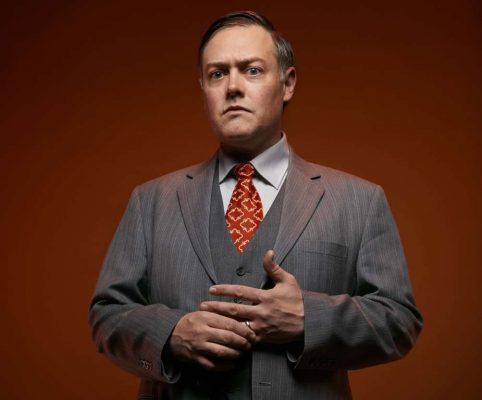REVIEW: Harold Pinter’s Betrayal unpacks painful love triangle
Posted on May 25, 2019 By Colin MacLean Entertainment, Front Slider, Theatre
 The new Broken Toys production of Harold Pinter’s Betrayal, playing in The Studio of the ATB Financial Arts Barns through June 2, is said to be the first Edmonton showing of the play. That’s a rather surprising note in a town that has seen a lot of Pinter over the years. (Movie fans might remember the terrific British film production in 1983 – starring Ben Kingsley and Jeremy Irons.)
The new Broken Toys production of Harold Pinter’s Betrayal, playing in The Studio of the ATB Financial Arts Barns through June 2, is said to be the first Edmonton showing of the play. That’s a rather surprising note in a town that has seen a lot of Pinter over the years. (Movie fans might remember the terrific British film production in 1983 – starring Ben Kingsley and Jeremy Irons.)
 With complex levels of characterization and signature vocal rhythms – the famous “Pinter pause” – the Nobel Prize-winning playwright has proven to be the burial ground for many an ambitious theatre company. This production from director Clinton Carew manages to avoid most of the pitfalls to give us a thoughtful show. Although the cadences remain upper-class England, the British reserve has been scraped away to lay bare the illusive basis of most of Pinter’s plays – the passions beneath.
With complex levels of characterization and signature vocal rhythms – the famous “Pinter pause” – the Nobel Prize-winning playwright has proven to be the burial ground for many an ambitious theatre company. This production from director Clinton Carew manages to avoid most of the pitfalls to give us a thoughtful show. Although the cadences remain upper-class England, the British reserve has been scraped away to lay bare the illusive basis of most of Pinter’s plays – the passions beneath.
Betrayal is based on the affair Pinter had over a seven-year period with a female BBC-TV host. Both were married to other people. Pinter tells his story in reverse chronology: The first scene takes place long after the end of the affair, and the final scene shows how it began. The approach is ingenious. We become emotionally involved in the story as the affair develops – while fully understanding the disillusion and pain that lie in store.
 The story of love, hate, guilt and power revolves around three people: Jerry (Chris W. Cook) is a literary agent. His best friend Robert (Cody Porter) is a publisher – and it’s Robert’s wife Emma (Elena Porter) Jerry is having an affair with. Most of the brisk 90-minute play is taken up with who knows what, when they find out, and the result. Carew designs his play to Pinter’s metronome. In the first (last) scene, years after the affair has ended, Jerry and Emma sit at a restaurant table trying to find some common ground.
The story of love, hate, guilt and power revolves around three people: Jerry (Chris W. Cook) is a literary agent. His best friend Robert (Cody Porter) is a publisher – and it’s Robert’s wife Emma (Elena Porter) Jerry is having an affair with. Most of the brisk 90-minute play is taken up with who knows what, when they find out, and the result. Carew designs his play to Pinter’s metronome. In the first (last) scene, years after the affair has ended, Jerry and Emma sit at a restaurant table trying to find some common ground.
Haltingly, they begin, “It was a long time ago…” And, “I thought of you the other day…”
The play demands a psychological intimacy, and expects much of the performers. Cook has a good-humoured quality and what you see is what you get. Cody Porter gets the choice role of the cuckolded husband. He excels at sublimating his angst and projecting real emotional wounds. The scene where he learns of his wife’s infidelity is particularly powerful. It’s all there just behind his eyes. The sensual Elena Porter is an effective counterpoint in the scene. She pretends to read a book, and is barely there, but her confusion and distress hang in the air – until she blurts out the inevitable words: “I’m having an affair with Jerry.”
 With the stage set starting at back of the theatre and with each scene moving closer to the audience (an interesting concept, though hearing the actors was a bit of a problem in the first scene), the play is staged in the intimate confines of the Arts Barn’s Studio, which eventually pushes the audience into much the same space as the performers. Carew’s quick, well-placed lighting cues are strongly married to the script, and his choice of solo piano music (Phillip Glass, I think) assists in the empathy.
With the stage set starting at back of the theatre and with each scene moving closer to the audience (an interesting concept, though hearing the actors was a bit of a problem in the first scene), the play is staged in the intimate confines of the Arts Barn’s Studio, which eventually pushes the audience into much the same space as the performers. Carew’s quick, well-placed lighting cues are strongly married to the script, and his choice of solo piano music (Phillip Glass, I think) assists in the empathy.
There is an element of humour in all this as well – which mostly comes as the actors play with the spaces between the words.
Betrayal outlines how an affair can easily turn into something voracious that consumes the lovers themselves. Some of the original dismissive 1978 reviews in London suggested that it was really “a small story of infidelity.” In this Broken Toys production, the closeness to the actors, and the excellence of their performances, demonstrate why the play today is accepted as one of Pinter’s finest.













